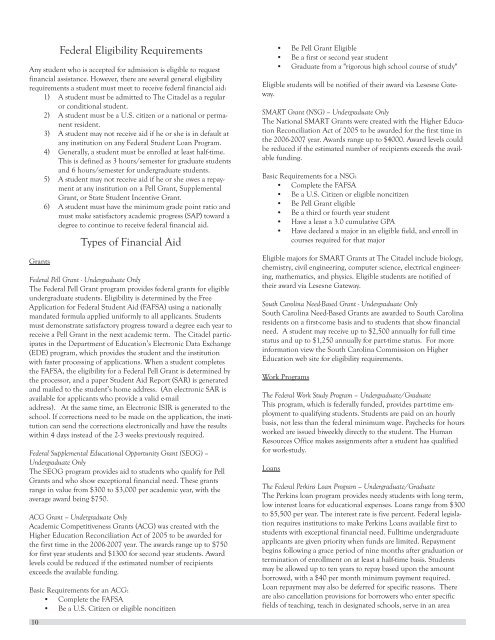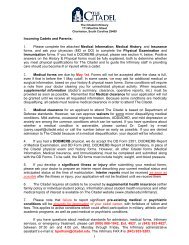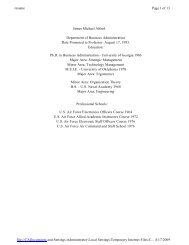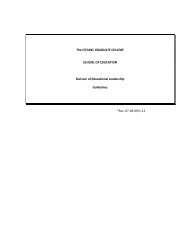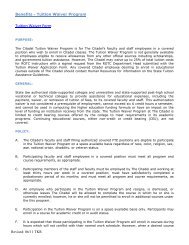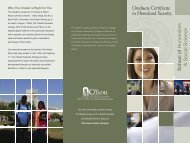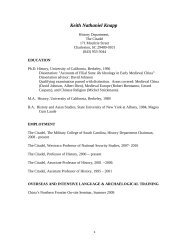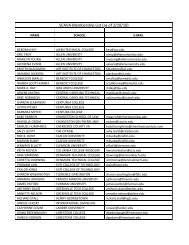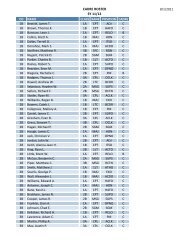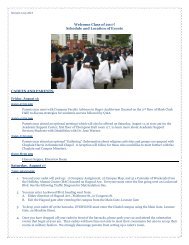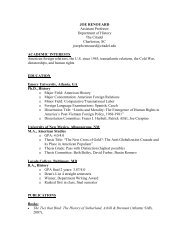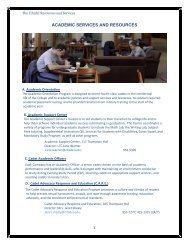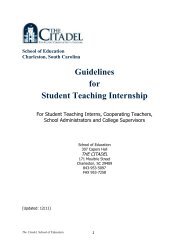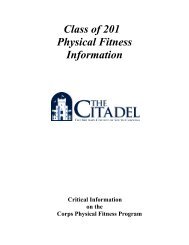2010-2011 Catalog: PDF Format - The Citadel
2010-2011 Catalog: PDF Format - The Citadel
2010-2011 Catalog: PDF Format - The Citadel
Create successful ePaper yourself
Turn your PDF publications into a flip-book with our unique Google optimized e-Paper software.
10<br />
Federal Eligibility Requirements<br />
Any student who is accepted for admission is eligible to request<br />
financial assistance. However, there are several general eligibility<br />
requirements a student must meet to receive federal financial aid:<br />
1) A student must be admitted to <strong>The</strong> <strong>Citadel</strong> as a regular<br />
or conditional student.<br />
2) A student must be a U.S. citizen or a national or permanent<br />
resident.<br />
3) A student may not receive aid if he or she is in default at<br />
any institution on any Federal Student Loan Program.<br />
4) Generally, a student must be enrolled at least half-time.<br />
This is defined as 3 hours/semester for graduate students<br />
and 6 hours/semester for undergraduate students.<br />
5) A student may not receive aid if he or she owes a repayment<br />
at any institution on a Pell Grant, Supplemental<br />
Grant, or State Student Incentive Grant.<br />
6) A student must have the minimum grade point ratio and<br />
must make satisfactory academic progress (SAP) toward a<br />
degree to continue to receive federal financial aid.<br />
Grants<br />
Types of Financial Aid<br />
Federal Pell Grant - Undergraduate Only<br />
<strong>The</strong> Federal Pell Grant program provides federal grants for eligible<br />
undergraduate students. Eligibility is determined by the Free<br />
Application for Federal Student Aid (FAFSA) using a nationally<br />
mandated formula applied uniformly to all applicants. Students<br />
must demonstrate satisfactory progress toward a degree each year to<br />
receive a Pell Grant in the next academic term. <strong>The</strong> <strong>Citadel</strong> participates<br />
in the Department of Education’s Electronic Data Exchange<br />
(EDE) program, which provides the student and the institution<br />
with faster processing of applications. When a student completes<br />
the FAFSA, the eligibility for a Federal Pell Grant is determined by<br />
the processor, and a paper Student Aid Report (SAR) is generated<br />
and mailed to the student’s home address. (An electronic SAR is<br />
available for applicants who provide a valid e-mail<br />
address). At the same time, an Electronic ISIR is generated to the<br />
school. If corrections need to be made on the application, the institution<br />
can send the corrections electronically and have the results<br />
within 4 days instead of the 2-3 weeks previously required.<br />
Federal Supplemental Educational Opportunity Grant (SEOG) –<br />
Undergraduate Only<br />
<strong>The</strong> SEOG program provides aid to students who qualify for Pell<br />
Grants and who show exceptional financial need. <strong>The</strong>se grants<br />
range in value from $300 to $3,000 per academic year, with the<br />
average award being $750.<br />
ACG Grant – Undergraduate Only<br />
Academic Competitiveness Grants (ACG) was created with the<br />
Higher Education Reconciliation Act of 2005 to be awarded for<br />
the first time in the 2006-2007 year. <strong>The</strong> awards range up to $750<br />
for first year students and $1300 for second year students. Award<br />
levels could be reduced if the estimated number of recipients<br />
exceeds the available funding.<br />
Basic Requirements for an ACG:<br />
• Complete the FAFSA<br />
• Be a U.S. Citizen or eligible noncitizen<br />
• Be Pell Grant Eligible<br />
• Be a first or second year student<br />
• Graduate from a "rigorous high school course of study"<br />
Eligible students will be notified of their award via Lesesne Gateway.<br />
SMART Grant (NSG) – Undergraduate Only<br />
<strong>The</strong> National SMART Grants were created with the Higher Education<br />
Reconciliation Act of 2005 to be awarded for the first time in<br />
the 2006-2007 year. Awards range up to $4000. Award levels could<br />
be reduced if the estimated number of recipients exceeds the available<br />
funding.<br />
Basic Requirements for a NSG:<br />
• Complete the FAFSA<br />
• Be a U.S. Citizen or eligible noncitizen<br />
• Be Pell Grant eligible<br />
• Be a third or fourth year student<br />
• Have a least a 3.0 cumulative GPA<br />
• Have declared a major in an eligible field, and enroll in<br />
courses required for that major<br />
Eligible majors for SMART Grants at <strong>The</strong> <strong>Citadel</strong> include biology,<br />
chemistry, civil engineering, computer science, electrical engineering,<br />
mathematics, and physics. Eligible students are notified of<br />
their award via Lesesne Gateway.<br />
South Carolina Need-Based Grant - Undergraduate Only<br />
South Carolina Need-Based Grants are awarded to South Carolina<br />
residents on a first-come basis and to students that show financial<br />
need. A student may receive up to $2,500 annually for full time<br />
status and up to $1,250 annually for part-time status. For more<br />
information view the South Carolina Commission on Higher<br />
Education web site for eligibility requirements.<br />
Work Programs<br />
<strong>The</strong> Federal Work Study Program – Undergraduate/Graduate<br />
This program, which is federally funded, provides part-time employment<br />
to qualifying students. Students are paid on an hourly<br />
basis, not less than the federal minimum wage. Paychecks for hours<br />
worked are issued biweekly directly to the student. <strong>The</strong> Human<br />
Resources Office makes assignments after a student has qualified<br />
for work-study.<br />
Loans<br />
<strong>The</strong> Federal Perkins Loan Program – Undergraduate/Graduate<br />
<strong>The</strong> Perkins loan program provides needy students with long term,<br />
low interest loans for educational expenses. Loans range from $300<br />
to $5,500 per year. <strong>The</strong> interest rate is five percent. Federal legislation<br />
requires institutions to make Perkins Loans available first to<br />
students with exceptional financial need. Fulltime undergraduate<br />
applicants are given priority when funds are limited. Repayment<br />
begins following a grace period of nine months after graduation or<br />
termination of enrollment on at least a half-time basis. Students<br />
may be allowed up to ten years to repay based upon the amount<br />
borrowed, with a $40 per month minimum payment required.<br />
Loan repayment may also be deferred for specific reasons. <strong>The</strong>re<br />
are also cancellation provisions for borrowers who enter specific<br />
fields of teaching, teach in designated schools, serve in an area


